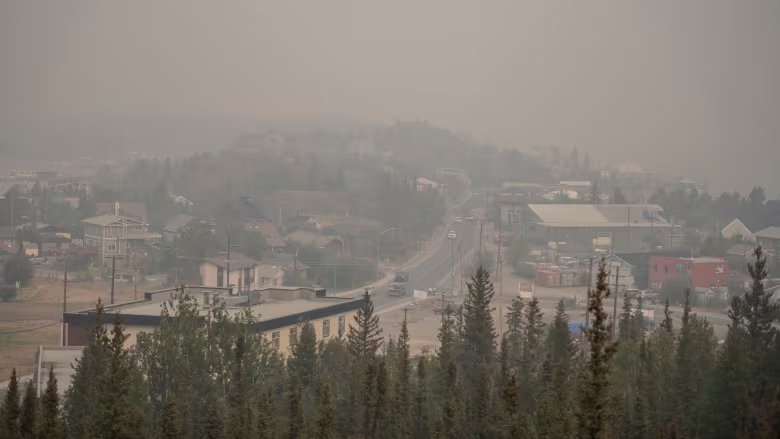Canada News
Health systems need to be better prepared for wildfires, says Yellowknife doctor

Heavy smoke from nearby wildfires fills the sky in Yellowknife in August 2023. (Angela Gzowski/The Canadian Press via RCI)
Review examines how health-care systems can improve their preparation and responses
More preparation will lead to better health outcomes for people in the wake of wildfires, says a Yellowknife doctor.
Dr. Courtney Howard, an emergency physician in Yellowknife, co-authored a review of how health-care systems can improve preparation and responses to wildfires and community evacuations. The review was published earlier this week in the journal Lancet Planetary Health.
It’s part academic work, part practical guide to help the health-care sector and governments be proactive to lessen trauma of severe wildfires.
“You can’t wait for a year to get the funding for the grant to hire the person to do the [work] — sometimes the fire is right there on your doorstep,” Howard said.
“We wanted to give people a one-stop shop where they had the latest information about the health impact [of] the wildfires, and really clear pictures and tables to help them figure out who to get on the phone and set up these relationships with.”
Some of the recommendations in the review include mandating air quality targets for health-care centres and better working conditions for health-care workers during wildfires.

A Western University researcher says the review article is likely the most comprehensive review of wildfires and health-care systems. It’s a great start to an understudied issue, says Nicole Redvers, director of Indigenous Planetary Health at the Schulich School of Medicine & Dentistry at Western University.
“The 2023 fire [around Yellowknife] was only one of many over the last 15 years, and I keep thinking about not only the firefighters but all the rest of the public being exposed for two to three months every summer for years on end and the cumulative potential health impacts of that,” Redvers said.
“Nobody is documenting that because we just don’t have the research funding in Canada available to do those kinds of longitudinal studies.”
Howard said building relationships before emergency situations caused by wildfires is key to keeping people safe. Government infighting and scrambling causes delays that lead to tragedy.
“Do you know the person that you need to approach to make a change and do you have a reasonable relationship with them? Do they trust you? Can you do something that’s new and hard together?” Howard said.
“I think that that is something that the North really specializes in. And I suspect that’s why we managed to evacuate the hospital as quickly as we did under such difficult circumstances.”
Redvers agrees, but doesn’t see that happening right now in the N.W.T., even though she thinks the tough conversation is needed. She points to the Dene Nation’s desire for a comprehensive review of the wildfire response.
“Some of our Indigenous governments up north are calling for this review, and that there is resistance to it goes to show that there still seems to be a disconnect between at least the Indigenous groups’ desires for review of the response and some levels of government,” she said.





















